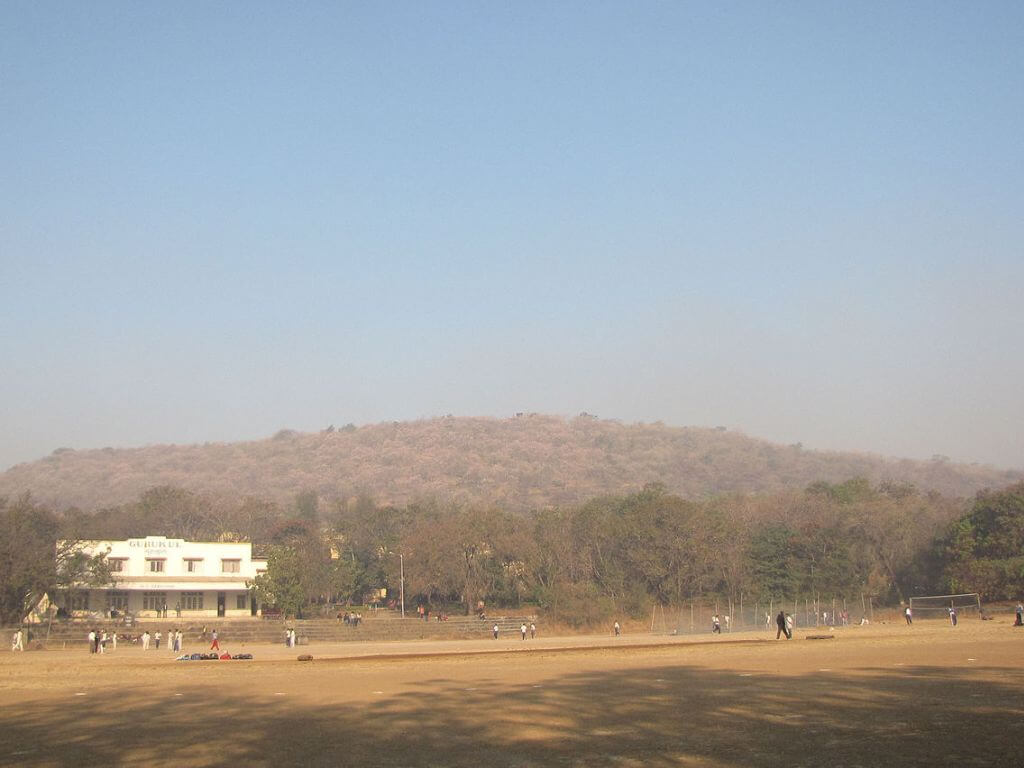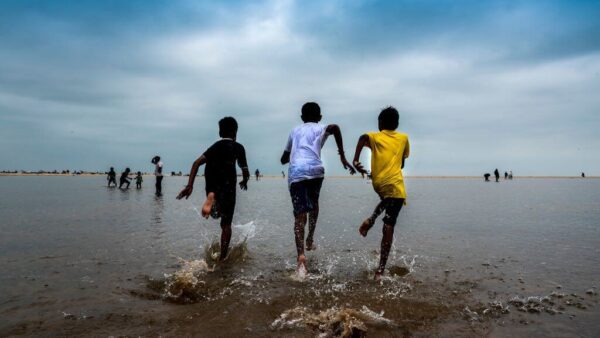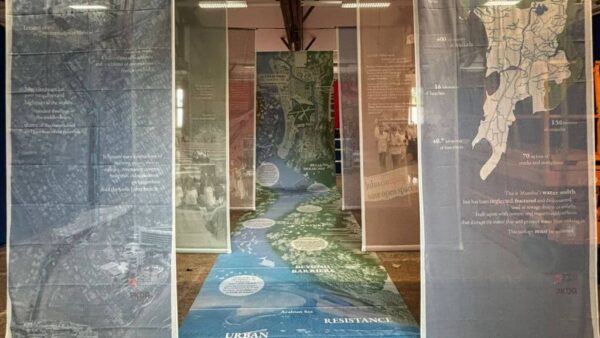Pune echoed Ladakh as individuals and groups that fought against a road project at the famous Vetal Tekdi last April gathered at the hill for a climate fast in solidarity with Ladakh-based educationist Sonam Wangchuk. Their intervention forced a pause in the controversial Balbharti-Paud Phata Link Road project which would have destroyed the hill and its ecology. But this is not enough, they say. The hill has to be declared a no-construction and no-development zone, urges Vetal Tekdi Bachav Kruti Samiti, an apolitical umbrella organisation of individuals and citizens’ groups.
The ‘Save Vetal Tekdi’ walk in mid-April last year saw protesters gathering in thousands – nearly 5,000 according to one estimate – and marching from Vetal Baba Chowk to Khandekar Chowk on the Law College Road. The unseasonal rain did not deter them. Besides the road, they want two other projects scrapped – tunnels at Sutardhara, Gokhale Nagar and Panchavati exits, and the controversial High-Capacity Mass Transit Route project. All projects have been proposed by the Pune Municipal Corporation (PMC).
The Samiti had won a battle in the Supreme Court in July 2021 when it upheld the National Green Tribunal’s verdict directing the PMC to get an environmental clearance for the mass transit project but citizens still want the project to be scrapped. It will damage the green zone, they say. The protest last April was significant as politicians from all parties joined the march without political tags.
It had taken the Samiti’s members eight long years of struggle, constant vigilance and action to come to this point. Significant or small victories kept them going – politicians saw reason and pro-road people began appreciating the open green space of the hill. Like Sharad Kelkar, 61, who had supported the link road because “it was shown that it would solve the traffic problem”. One meeting organised by the Samiti allowed him to study the project which led him to the realisation that “instead of reducing the burden on the road, it will add to the burden as well as cause environmental damage”.
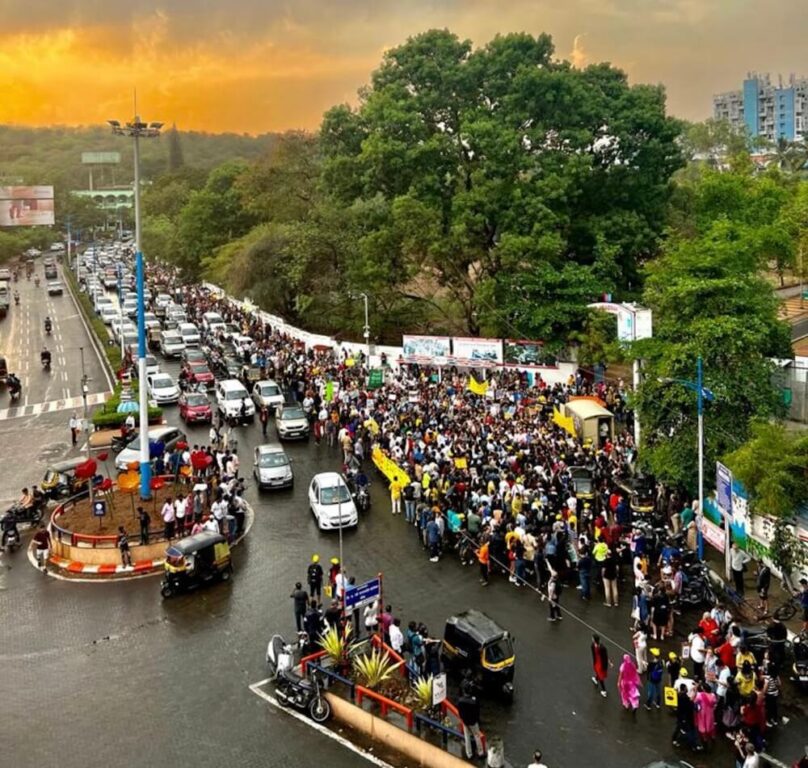
Photo: Prajakta Panshikar-Divekar/ Vetal Tekdi Group, Facebook
Heart and lungs of Pune
An open green space like Vetal Tekdi is important for a dense and expanding city for its own sake but also to combat climate change and ensure that there are democratic and free spaces for people from all walks of life.
Vetal Tekdi (tekdi means hill in Marathi), in the heart of Pune, is a rising stretch of green across 10.5 square kilometres. Rich in biodiversity, its elevation of nearly 700 metres gives the city one of its highest points, while its muddy paths, a small pond, and forested areas attract hundreds of joggers, cyclists, fitness freaks, tourists, and nature lovers every day. Initially a grassland, focused plantation drives turned some parts of the hill into forest clusters.
“Situated in the hustle and bustle of western Pune, Vetal Hill is a spur of the Western Ghats. This hill complex in Pune city covers a large region, starting from Kothrud in the west and extending to Chatushrungi in the northeast. Vetal Hill traverses Pune’s Panchwati, Fergusson College, and Law College areas and marks the tallest point in the city at 702 m above sea level,” states this paper.[1]
The hill stands out amidst the maze of high-rises, roads and flyovers. A research paper, The Vetal hills: An urban wildscape in peril, by Ashish Nerlekar and DK Kulkarni, describes the “hill complex as an important forest patch in the city that has undergone severe habitat degradation over the years and hence is in urgent need of conservation”. This is a much-needed reminder as the city expands.
Pune’s urban area grew 130 times, from five square kilometres in 1817 to 669.30 square kilometres in 1997, according to documents in the University of Pune. In October 2017, 11 more villages merged with the city.[2] With this came the demand for more roads. As Pune’s vehicle population grew to 43.4 lakh almost equalling residents,[3] traffic flow began to be proritised over ecology.
The proposed Balbharati-Paud Phata link road will save “only three minutes of a commuter’s time” because drivers will hit a traffic bottleneck near the law college, argue Samiti activists. The time-ecology equation did not make sense. Environmentalists, teachers, students, doctors, and slum dwellers from Gokhale Nagar near the hill joined forces to form Vetal Tekdi Bachav Kruti Samiti in 2022 adding weight to citizens’ forums and residents’ associations.
Prajakta Divekar, a core member of the Samiti, lives near the hillock. “I remember going to the tekdi often, it was a place for college students to hang out. Since 2010, I have been going there for recreation. It is one of the largest continuous shallow aquifers found in a city in Maharashtra. Aquifers store rainwater, which feeds natural springs and wells and rivers,” she explained. Economist Sumita Kale, also a Samiti member, describes the hill as unique and worthy of preservation: “The unplanned growth, driven by real-estate compulsions, is more about the value of the land. The value of open spaces and health are not factored into it.”
Citizens in the area had been collaborating on an informal voluntary basis for garbage clearance, sensitising people about segregation, and traffic issues. “With Vetal Tekdi, it became a confrontation with the PMC. We are not anti-government but we want the open space to remain. When it comes to natural heritage, people do not understand the value,” said Kale.
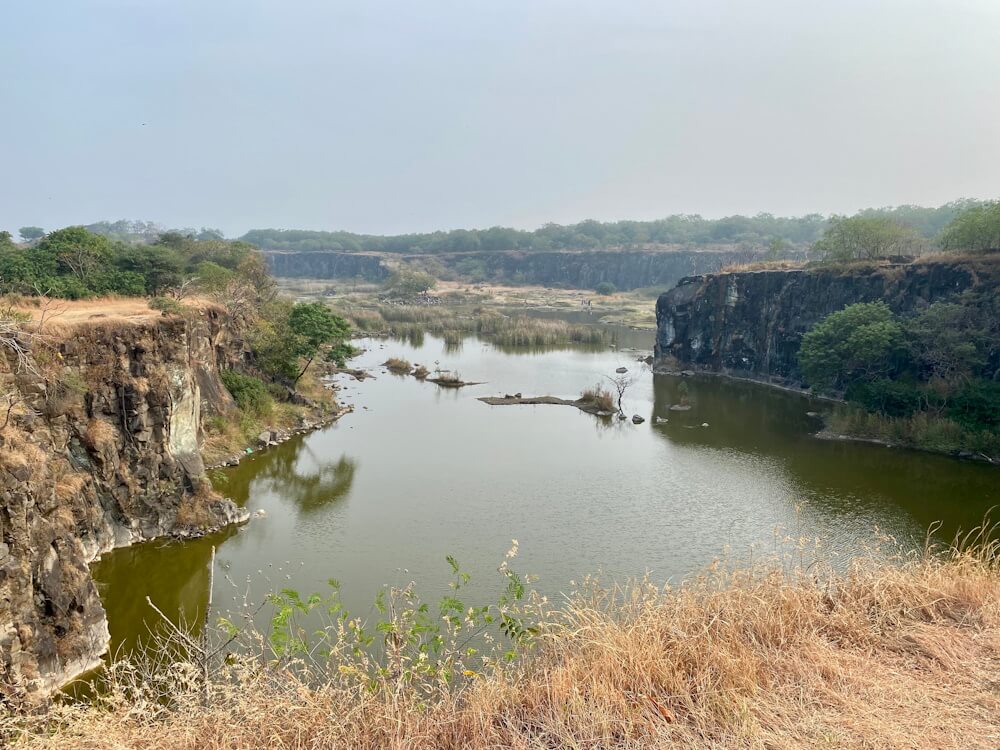
Photo: Ranjeet Rane
Old hill, old fight
The link road is one of the many projects planned here. Back in 2012, a bird observation and amphitheatre plan were similarly resisted by the citizens’ groups.[4] Later, the PMC proposed a nature trail which involved building cement steps. “The plans also included fibre glass structures of anthills even though the tekdi has real anthills,” says Kale.
The sprawling Vetal Tekdi was considered a perfect site for the 2.1-kilometre Balbharti-Paud Phata Link Road first in 1982 and was added in the draft Development Plan of 1987-2007. Three women — Lata Shrikhande, Tara Warrier and Sulabha Brahme — led[5] the fight to oppose it, forcing the authorities to scrap the plan in 1987. The PMC once again green-lighted it in 1996 although a traffic survey two years earlier had found that the road would not ease congestion. The 36-kilometre High-Capacity Mass Transit Route was planned as a six-lane fully elevated road with two lanes for the Bus Rapid Transit System.
Around 1,500 trees are to be axed in this ecologically sensitive area, affecting biodiversity and ground water level. A grassland is not a wasteland but as important as trees, Kale cites from a research paper. “Misunderstanding savannas for degraded forests has done a lot of damage through misplaced restoration policies and has even resulted in ignoring entire biodiversity hotspots. A major cause for this misunderstanding is that ecologists and policy makers do not yet widely understand the differential drivers of old-growth forests and old-growth savanna biodiversity,” writes researcher Ashish Nerlekar.[6]
In 2022, the construction of a wall at Law College hill slope of Vetal Tekdi had the Samiti worried as the area has seven major natural streams which recharge groundwater. Half an acre of the hill slope had been excavated in 2019 and around 100 trees felled. Dr Himanshu Kulkarni, a hydrogeologist working with non-profit knowledge institution Advanced Center for Water Resources Development and Management (ACWADAM), remarked that this region is an important system of aquifer to recharge the city’s water zones. The Vetal Tekdi area has aquifers with an estimated total potential groundwater storage of more than 5.5 cubic millimetre.[7]
How the fight was mounted
In the various phases of citizens’ struggle to save Vetal Tekdi, people have used the Right to Information (RTI) to know about the PMC’s plans and then mounted outreach campaigns followed by on-ground action such as protest marches.
“It’s very painful to go through the technical documents, but we did that and told the PMC where it is wrong,” says Kale. The more research-oriented people in the Samiti waded through sheafs and piles of papers to extract useful information. The core group of 20 to 25 people are actively engaged in planning and conducting campaigns, poster making, and handling social media, which has been crucial in garnering support.
“The PMC’s old data and studies show that the road is not needed. Through presentations and social media, we informed people about this. It’s about how useful the road will be and what destruction it will cause. We asked people if this was their vision for Pune,” says Kale.
Sushma Date, a Samiti member, added: “The 30-metre link road will connect Paud Road and Senapati Bapat Road to give access to a posh upcoming township. This is the main reason for the project. We knew it but had no proof. Later, we found the plan through an RTI and made it public. This made an impact.” The PMC’s own Environment Impact Assessment had noted that the hill is “high priority for conservation” while its traffic survey remarked that “hardly 20 percent will be diverted to the new road”. None of these reports had been released to the public, said Date.
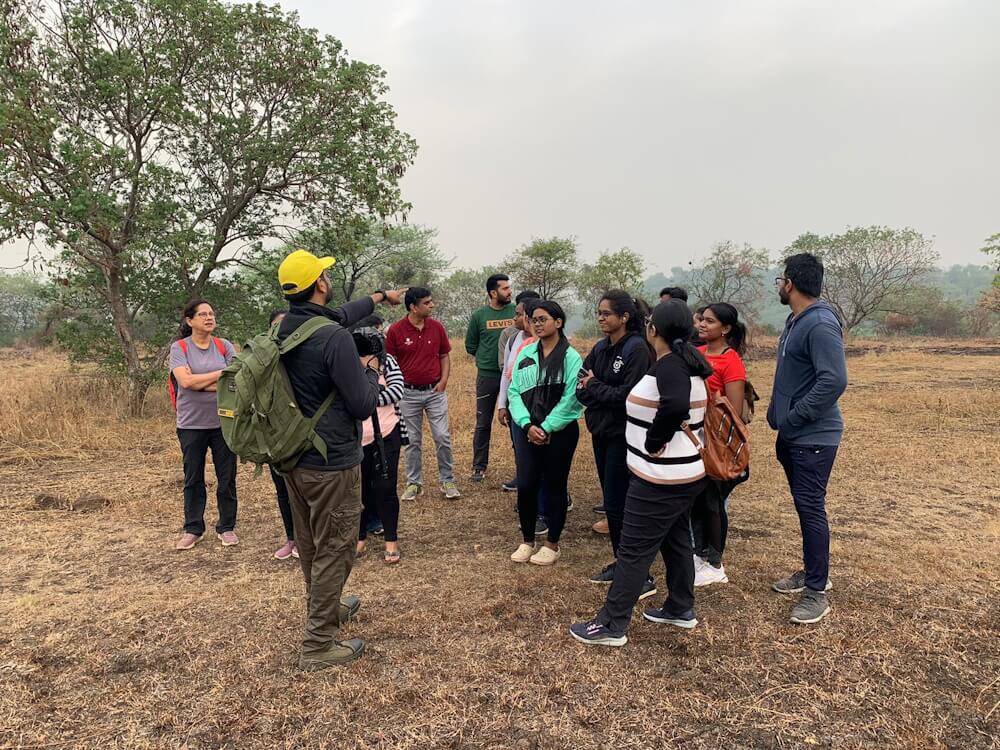
Photo: Ranjeet Rane
Yet, the PMC is not calling off the project. Aniruddha Pawaskar, chief engineer (road), said, “The project is in abeyance. Nothing is happening on the ground.” There are no answers for why the project has not been scrapped despite the PMC’s reports stating that “further degradation of the land surface is likely to damage the fractured/jointed section in the Basalt rock, disturbing continuity in the groundwater movement”.
The Samiti members have kept the engagement with the public going for years with signature campaigns, street plays, poems, songs, small rallies on the hill, and nature trails to popularise the ‘Save Tekdi Movement’. Occasionally, seminars and presentations were held. The Samiti roped in people through poster-making competitions and birding trails with Ranjeet Rane, a birding enthusiast and member of the Samiti, and made youngsters hold posters at street corners. All this culminated in the huge march on April 15 last year.
For Rane, a passionate birder, the hill was an integral part of growing up where he built cherished memories of school outings and walks with the family. “I have been an avid tekdi person. After almost 15 years when I returned to Pune in 2021, I saw a housing complex near it. It was an eyesore.” Rane used his experience to educate people through nature walks there for students, residents and nature lovers. “I have been driving home the point that the tekdi is so much more than just another landform in the city,” he says.
A green vision
The hill is many things at once – a diverse ecosystem, a biodiversity reserve, an urban forest fighting climate change, a community common, and an open inclusive space for all. Youngsters, preparing for physical training to join the police and army, train here. People come for some quiet and peace, to meditate. “We keep engaging with people through clean-up drives and other events. It’s not that we only oppose and protest, we also work for the space,” says Date.
When some of the Samiti members gathered at Vetal Tekdi this March 17 to show solidarity with Wangchuk in his climate fast, its ecology and usefulness was brought back into focus. They see common ground between what they and Wangchuk are fighting for. They recognise that they have managed to stall or stop ecologically damaging projects but the fight is never over.
There is complete silence from the PMC about the fate of Vetal Tekdi but the Samiti members and supporters are firm that the green hill cannot be sacrificed for a few car users. “The tekdi is crucial for our societal survival. Degrading these last lungs will leave us with a scarred social structure where resources will be only available to those who can afford,” says Rane. Adds Date, “We don’t want Pune to go the Bengaluru way, we want our groundwater to be recharged.”
Shobha Surin, currently based in Bhubaneswar, is a journalist with 20 years of experience in newsrooms in Mumbai. An Associate Editor at Question of Cities, she is concerned about Climate Change and is learning about sustainable development.
Cover photo: Creative Commons

